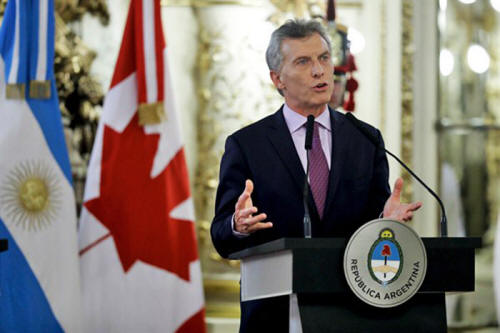|
by Patrick Corcoran from WPR Website
during a press conference with Canadian Prime Minister Justin Trudeau, Buenos Aires, Nov. 17, 2016 (AP photo by Natacha Pisarenko).
While he has largely succeeded in the
first goal, the second remains stubbornly out of reach, and efforts
to build an enduring legacy will only grow more complicated in the
years to come. Macri's surprising victory in the 2015 election - polls initially showed him likely to lose outright in October's first round of voting - ended 12 years of rule by Nestor Kirchner and his wife, Cristina Fernandez de Kirchner.
Macri's triumph stemmed largely from his status:
For the Kirchners and their Peronist party, politics was akin to warfare.
In their 12 years controlling the presidency - the first four via the late Nestor, the following eight under Cristina, with both pursuing a similar socialist-leaning program - the Kirchners sought popularity through conflict with many adversaries.
That ranged from political challengers, including Macri, and protesting unions to multilateral organizations, foreign countries, multinational oil companies and, most famously, New York hedge funds.
They also thumbed their nose at
increasingly voluminous evidence of corruption implicating them and
their closest political and business allies.
His team settled the self-defeating 15-year dispute with hold-out bond investors, primarily American hedge funds that the Kirchners had labeled "vultures," and brought the country out of a needless default.
Macri has taken measures both to rein in inflation and report price indices faithfully.
Finally, he has distanced his nation
from the Kirchners' anti-Western friends, including Iran and
Venezuela, while Argentina has emerged as a leading opponent
of Latin America's populist left.
It will take more than just these easy corrections of the Kirchners' missteps for Macri to consolidate his position and deliver on his promise of reform. Macri himself appears to know that.
This week he admitted, after huddling
with his Cabinet to take stock of their progress, that he had raised
economic expectations too high and
promised "magical" change when he
took power a year ago.
More worrying thanhis own political misstepsare the economic cloudsstill hovering over Argentina.
When it comes to placing his own stamp on the country, Macri so far has faltered.
He has failed to pass any signal legislative initiatives, and congressional opposition has turned into a persistent thorn.
During the past month alone, a coalition of opponents banded together to defeat a government-supported political reform; the lower house passed a budget bill with tax increases, over the administration's objections; and Macri stumbled in offering an amnesty to Argentines who hold cash in offshore accounts.
That amnesty debacle turned a relatively
straightforward plan into a national discussion of his family's
offshore holdings, which emerged as part of the
Panama Papers scandal.
But his policies appear to emulate the strategies that have failed spectacularly in Mexico and elsewhere in Latin America. He has called in American and Israeli advisers who favor greater militarization of the police.
His government is packing jails with low-level drug offenders. And he has sought authority to shoot down drug transport planes.
So far, this strategy has failed, and
recent polls show that
insecurity has displaced inflation
as the problem that most worries Argentines.
Macri inherited a country in recession, from which it only just emerged in the third quarter of this year.
Owing largely to outside factors, like
the economic slowdown in China and the political meltdown in Brazil,
most forecasts predict that for the duration of Macri's current term
Argentina won't surpass 3 percent growth, a paltry figure for a
middle-income nation.
One recent poll from the generally pro-government newspaper Clarin found that 43 percent of respondents had negative views of his presidency, compared to only 26 percent positive.
It's early yet, but these are not
encouraging figures for Macri supporters. And with midterm elections
next year, Macri's ability to secure a more favorable congressional
distribution that would help him push his reform agenda is on the
line.
The Peronists might remain a more substantial force than Macri's PRO party, which he founded in 2005 and exists as little more than a vehicle for his own political ambitions.
But a steady drumbeat of news about
myriad corruption scandals continues to taint the Kirchner legacy
and the Peronists.
For now, his opponents' lack of cohesion
has allowed Macri to pick off allies among the Peronists and avoid a
consistently united front against him.
A comparison between perhaps the most significant presidencies in Argentina's recent history - that of the Kirchners and of Carlos Menem, from 1989 to 1999 - is instructive:
But Macri's anodyne, technocratic
center-rightism has neither the modernizing ethos of Menem's mad
dash toward the Washington Consensus, nor the Kirchners' indignation
about Menem's overreach and their overriding sense of nationalist
spirit.
The last century of Argentine history offers much the same lesson, and from a policy perspective, Macri's presidency has been tonic for a sickly nation. But this year has also shown the electoral vulnerability, in both hemispheres, of unremarkable if steadfast competence.
Twelve months into his tenure, Macri
hasn't done enough to outline a vision for his presidency and
protect himself from disappointed voters...
|


